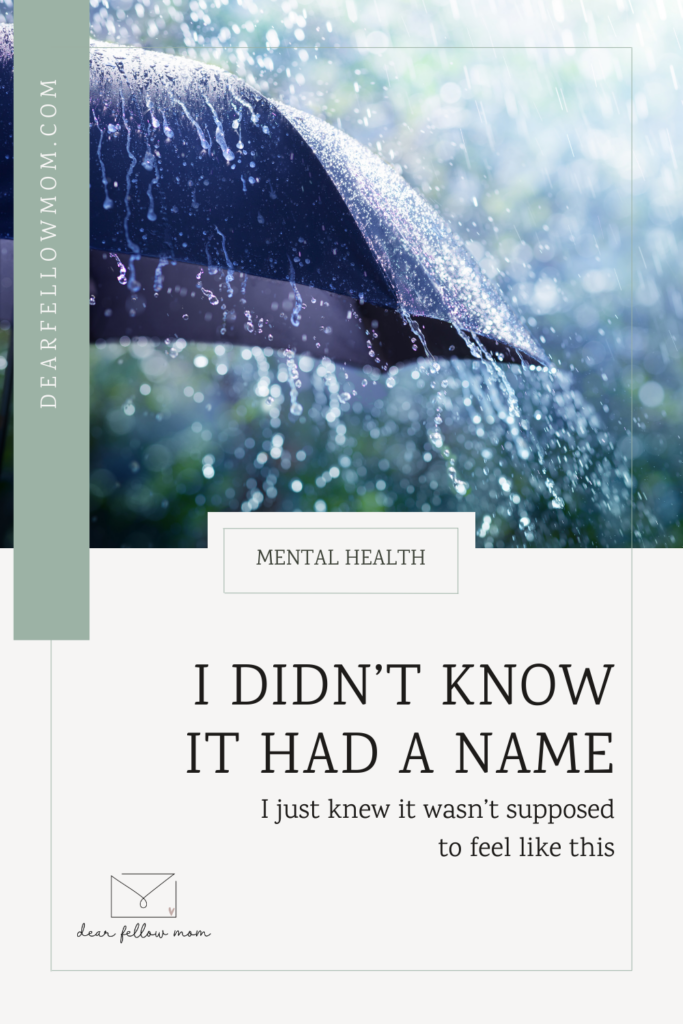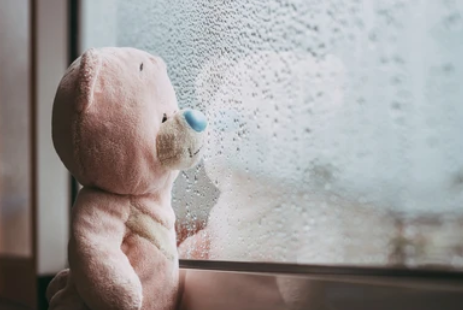The lack of mental health support for postpartum mothers in this country is appalling – lack of support in general, come to that. One postpartum “check-up” weeks after birth and you’re good to go with little to no acknowledgment of mom’s mental well-being.
They do the bare minimum in regard to postpartum depression.
In my case, I was given a short mental health questionnaire at both of my postpartum visits (c-section mamas get an extra postpartum visit, whoopee). Much like a Cosmo Quiz, I tallied my own results which determined my level of risk for postpartum depression. I scored just about as high as I could indicating I was at risk.
The questionnaire was included with the rest of my intake paperwork which was given to the nurse and doctor. My results were never brought up during my record breaking quick visits. My incision was assessed and I was cleared for physical activity.
I knew I was at risk for postpartum depression before I had even given birth. I have been battling depression and anxiety my entire life and the disruption of hormones I was about to go through was not going to smooth those things out.
You typically see postpartum depression represented as a mom lying in bed all day, lethargic, crying, with little to no interest in taking care of herself or her newborn baby.
That was NOT my experience.
Hormonal hellfire with a dash of self-deprecation
The term “baby blues” is used to describe the feeling of sadness, anxiety, and restlessness you get shortly after birth while your hormones readjust. It’s short-lived, lasting an average of 1-3 weeks, and is mild not truly impacting daily life or your relationships.
Sitting on the floor of a darkened nursery rocking back and forth cradling one screaming baby as another cries out for you from their crib while ugly sobbing and chanting to yourself, “I don’t deserve to be a mom,” might be something more.
One minute I was up, the next I was down, and in between I was angry. I could go from setting up adorably curated amateur photo shoots, to bawling so hard I would throw up, to blood boiling rage cursing myself for not being “normal.”
On top of that, I was painfully aware of the eyes on me watching my every move. I knew I was being judged. Humans judge, we can’t help it. Even if you check yourself and reframe the thought it comes just the same.
But as much as I worried about what others thought of me as a mother, nothing they could have been thinking behind my back would have been as awful as my own internal dialogue.
“They’d be better off without me.”
“I’m just screwing this all up.”
”My boys are going to hate me someday.”
“Why don’t I know what I’m doing?”
“I’m a terrible mom.”
“God shouldn’t have made me a mom.”
“I’m supposed to know how to do this.”
“They deserve so much better than me.”
I’ve never truly considered suicide but I knew the way I would do it if I was so inclined and I absolutely never came anywhere near harming my children.
It was more that I just didn’t want to exist anymore. I wanted to just quietly disappear and let them live out their wonderful happy lives without me. But I couldn’t just walk away and live knowing what I’d left behind either.
I sought therapy early on and was told I just needed more sleep and to take more “me time.” Not a lot of progress was made in regards to postpartum depression or anxiety even though I shared quite a bit.
In the end, my negative energy was just reallocated to other areas.

obsessive behavior-the overlooked red flag of postpartum depression
Obsessive behaviors is not something I’ve traditionally seen associated with postpartum depression. This was one of those red flags that was literally slapping me in the face and I wasn’t going to acknowledge it.
My boys were born days before the Covid shutdowns started. This meant we no longer had access to resources like having a lactation specialist visit regularly to assist with breastfeeding.
I could go on a lengthy tangent about how we accidentally ended up combo-feeding (offering breastmilk and formula) rather than trying to exclusively breastfeed (spoiler alert: I’m still bitter about it) but that’s a story for another post. Ultimately what you need to know is that I hated formula and it was my mission to stop having to rely on it.
So I took it upon myself to try anything and everything to get my milk supply up.
I read all about galactagogues, aka lactation inducers. Certain foods are high in galactagogues, like oatmeal for instance. I ate oatmeal for breakfast every single day without fail. Not great for the postpartum weight loss but it was supposed to get my milk makers flowing.
I took fenugreek supplements. Fenugreek being a seed extract that has had success increasing milk production.
Diversifying my options, I took non-fenugreek lactation supplements as well.
Hydration is important in any breastfeeding journey but I took it further than just the refillable water bottle. I stocked my fridge full of Body Armor Lyte drinks because it was made with coconut water (only 10% but the internet said it helps).
I read every article on La Leche League’s and Kelly Mom’s websites, combed mom blogs for advice from other twin mamas, and followed social media breastfeeding accounts and influencers. I implemented each new strategy I came across hoping that one would be the one that works.
Mind you, I was switching things up so often no method had a chance to actually gain any traction, let alone succeed. I had a zero-tolerance policy for failure which is what it was when a method didn’t work straight away.
If I wasn’t nursing, I was pumping. Overnight, first thing in the morning, after every feeding, and if I had a little extra free time. Sometimes I wondered why I bothered to even put a shirt on.
On top of all of that, I refused to give bottles (someone was always there to do this, I didn’t starve my babies).
At first, I used the “I don’t want to confuse breastfeeding” excuse. Then it was that I had to pump. But really, I just hated formula that much and blamed it for my inability to exclusively breastfeed.
In the end all my obsessive behaviors were futile. We combo-fed up to 11 months when I finally laid my armor down and let go of nursing.
We dropped bottles too shortly after the boys turned one.

The creativity of my irrational fears and intrusive thoughts is unparalleled
Fun fact: I’ve never left the house alone with my boys, other than to drive them to and from school or their grandparents’ houses. It’s still true today as I type this and the boys are just shy of 4-years-old.
One of the most frustrating things living with anxiety is that I know rationally that I am acting insane. I’m not ignorant to the fact that my brain is making up the most ridiculous scenarios that are highly unlikely to happen.
Anxiety don’t care. Anxiety don’t give a fart.
Give me a scenario, any scenario, and I will tell you how that scenario can end in catastrophe. I’m like the father from My Big Fat Greek Wedding proving every word is Greek.
Parks, playgrounds, and parking lots are my biggest triggers.
I would have vivid intrusive thoughts about my boys being kidnapped. To the point I wasn’t sleeping and instead bawling my eyes out because it felt like one or both were truly gone.
From the highest highs to the lowest lows
It’s a well-known fact that J.K. Rowling wrote dementors to represent depression in her acclaimed series Harry Potter. Honestly, it was the most accurate physical representation I have ever read.
At one point Ron says, “It was like I would never be cheerful again.”
There have been moments where I’ve actually asked myself, why aren’t you happier? You should be feeling… more. This is everything you’ve ever wanted why are you not over the moon?!
I was paralyzed with guilt over wanting something so badly for so long, getting it, and not being able to feel the way you’re “supposed to feel.”
There are also times I feel good. Never truly great because after the highs come the lows at full octane. I’m always waiting for the other shoe to drop.
with knowledge comes power
Postpartum depression and anxiety robbed me of the first few years of my sons’ lives. Truth be told, it still continues to chip away at my joy and I’ve reached my limit.
I’ve found a new therapist, which was a challenge in and of itself. Another testament to the superior health care offered for mental health care. *rolls eyes dramatically*
For almost a year we’ve met bi-weekly. It’s slow going, especially because I don’t go as often as I’d like, but it’s helped to keep the really dark thoughts at bay.
Recently, I’ve started a new vitamin and diet protocol to balance my hormones and lower my cortisol levels. It’s too early to report any results but I’m hopeful which is progress alone.
Postpartum depression and anxiety will always be a part of my life. That’s just the way of it. But now I have the tools and support to manage the lows so I can truly enjoy the highs.
If you’re suffering from postpartum depression, please reach out to someone. You aren’t broken and it isn’t hopeless even though it feels that way.
You’re not alone.

